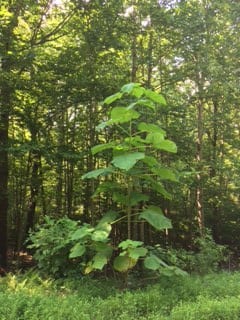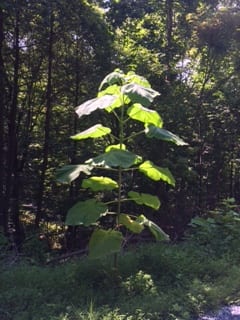 Paulownia, also known as the Royal Paulownia, Princess or Empress Tree, looks like vegetation out of a science fiction novel. A deciduous tree, the Pawlownia grows quickly, from eight to twenty feet in one year, and sports large, heart-shaped leaves in opposite pairs on the stem. Spring flowers are long and bell-shaped like foxglove and produce literally millions of seeds.
Paulownia, also known as the Royal Paulownia, Princess or Empress Tree, looks like vegetation out of a science fiction novel. A deciduous tree, the Pawlownia grows quickly, from eight to twenty feet in one year, and sports large, heart-shaped leaves in opposite pairs on the stem. Spring flowers are long and bell-shaped like foxglove and produce literally millions of seeds.
The tree was named in honor of Russian Princess Anna Pavlovna, daughter of Tsar Paul I and wife of Prince Willem of The Netherlands – apparently a successful promotional strategy. As an exotic, the Paulownia enjoyed widespread popularity in the United States during 1830’s. Today, Princess Trees are planted in reforestation projects to prevent soil erosion, particularly in China.
But not everyone appreciates its assets.
Controversy rages about whether Paulownia is native to North America. The National Park Service and other government organizations, such as the Southeast Exotic Pest Plant Council, categorize the tree as an invasive species. Don’t plant this tree, these organizations warn, because it spreads easily and regenerates from its root after cutting.
On the other side of the controversy are promoters like the American Paulownia Association. They “encourage landowners to plant, manage, and harvest Paulownia” for profit, and to promote “Paulownia products in the domestic and export markets.” The wood is light, fine-grained, resistant to rot and warping. Thus it is valuable for making musical instruments, chests, boxes and Japanese geta.
Here at Vanaprastha, the forest in large part nurtures oaks, tulip poplars, sassafras, maples and pine. Only in cleared areas on slopes and along roadsides do Princess Trees thrive. With abundant rainfall such as we’ve had this summer, Paulownia grow as if out of nowhere.
 Since we do not plan to cultivate Paulownia for profit and Princess Trees out-compete native mountain laurel and shrubs that attract butterflies and birds, these exotic, science fiction trees will fall to a hand-machete.
Since we do not plan to cultivate Paulownia for profit and Princess Trees out-compete native mountain laurel and shrubs that attract butterflies and birds, these exotic, science fiction trees will fall to a hand-machete.
We all choose our treasures and trash.



0 Comments